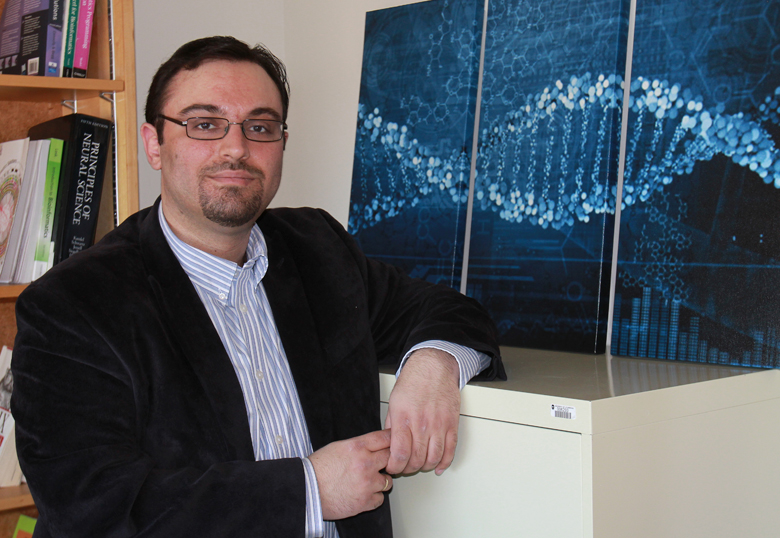The federal government has named Dr. Athanasios Zovoilis, a professor in the Department of Chemistry & Biochemistry, a Tier II Canada Research Chair in RNA Bioinformatics and Genomics.
The Honourable Kirsty Duncan, Canada’s minister of science, recently announced $125.9 million in funding for 142 chairholders. Along with the Canada Research Chairs, Duncan introduced a new Equity, Diversity and Inclusion Action Plan to address the lack of diversity among Canada Research Chairs.
“Our government is committed to promoting equity and diversity within the sciences. We need to work harder to ensure that talented researchers have the opportunity to advance. The announcement of the action plan is an important step towards a more inclusive, open and diverse research environment in Canada,” says Duncan.
In addition to $500,000 in funding through the Canada Research Chair program, Zovoilis will receive more than $53,000 from the Canada Foundation for Innovation’s John R. Evans Leaders Fund for laboratory tools and equipment.

Zovoilis, a bioinformatician and genomicist, came to the University of Lethbridge from Boston’s Harvard University to establish and pursue a research program aimed at developing personalized treatments for diseases like cancer and dementia. Zovoilis joined the U of L's Alberta RNA Research and Training Institute (ARRTI), a research centre devoted to RNA research. During the last 10 years, the U of L has made a significant investment in the fast-developing field of RNA research by establishing ARRTI and attracting world-class scientists that develop cutting-edge research in understanding how RNA applications can support human health and biotechnology innovation.
“It was not a very difficult decision, I have to say,” says Zovoilis. “Having lived in Canada before, I know there’s support for science, for families and for integrating people to the society. It makes the perfect combination.”
Originally from Greece, Zovoilis began medical studies in his homeland and completed them in Germany. After witnessing the impact of diseases like Alzheimer’s and cancer on members of his community, he knew he wanted a career where he could help people.
“I didn’t like this feeling of helplessness. That was one of the things that motivated me to go to medical school,” he says.
While in medical school, molecular biology captured his interest. The Human Genome Project was underway at the time and the research possibilities it presented were captivating.
“A new era was starting and I decided to specialize in it,” says Zovoilis. “I was convinced that if we want to fight Alzheimer’s and cancer we have to understand what’s happening at the molecular level in our cells. If we understand the basic mechanisms that underlie these diseases then we will be able to fight them more efficiently.”
He pursued a doctorate in molecular genetics and began working with breast cancer patients, looking for mutations in genes known to cause cancer. Studying only two out of tens of thousands of genes, coupled with the limitations of DNA sequencers, meant progress was slow. However, technological advances soon led to much faster DNA sequencing and produced larger amounts of data. Zovoilis determined to get training in bioinformatics, a new discipline that provides the computer programs that can read and analyze the data produced by modern sequencers. He went to the University of Manchester in England to take further training and then joined the bioinformatics group at the Michael Smith Genome Sciences Centre in Vancouver, an organization at the forefront of personalized medicine in Canada. There he joined other scientists who were interested in analyzing noncoding sections of the genome, or what was once known as junk DNA.
Because it was at the forefront of analyzing noncoding sections of a genome, Zovoilis then went to Harvard as a research fellow. His research there, recently published in the journal Cell, the top journal in molecular biosciences, revealed a connection between these noncoding sections of the genome and cancer. Now at the U of L, Zovoilis will continue this work with the eventual goal of bringing testing to everyday clinical practice.
“In this lab, we specialize in reading the book of life and we use this information to provide personalized medicine opportunities for patients in the near future,” says Zovoilis.
Such an approach is not as widely available in Canada as it is in the United States or through the Genome Science Centre in British Columbia but he hopes to launch a similar project in Alberta.
“We intend to find partners in this initiative,” says Zovoilis. “It has to be a pan-provincial initiative but southern Alberta can be part of this.”
Zovoilis adds that a personalized approach doesn’t perform miracles but many studies have shown that targeted therapies can help and genomics is the main tool to find them.
“I wanted to come back to Canada,” he says. “Canadians are very open minded and there has been, in recent years, significant investment in research. It is not advertised a lot but, especially here in Alberta, universities have improved substantially their capabilities. They have expanded their programs. I see a huge potential, especially at the U of L. That’s one of the main reasons why I decided to come here.”
